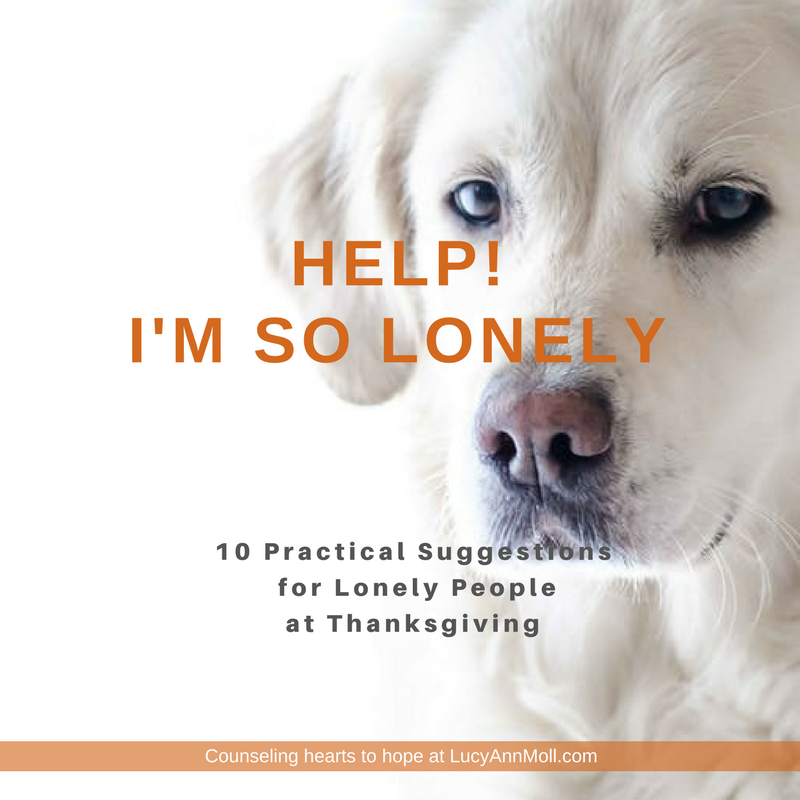
by Lucy | Dec 18, 2019 | biblical counseling, emotions
When Christmas cheer brings on isolating loneliness, how can your survive, even thrive?
This short article shows that you really can find God in your loneliness at Christmas! And it’s NOT another tiresome to-do list!
Loneliness at Christmas, or any time of the year, unsettles us. It’s uncomfortable and unwanted. It may drive us to seek false comforts: TV, Facebook, sleep, food, booze, sex. It often turns us inward, compounding the lonely ache in our hearts.
Consider Lydia Brownback’s description of loneliness at Christmas.
“Looks like winter is here!” Brownback called to the mom next door as she and her neighbors cleared their cars and walkways.
“Indeed it is!” the neighbor responded. “And the timing of all this snow is perfect. After supper we’re going to make hot chocolate and decorate the Christmas tree. The kids are really excited.” Picturing her neighbor spending quality time with family sparked a deep sense of loneliness in Brownback. She had no one to share the festivities with, and it hurt, she shared in her book, Finding God in My Loneliness.[1]
The good news is that when we seek God as our true treasure, we find what we’ve been looking for all along: Him.
What Is Loneliness?
Loneliness is “an emotionally painful sense of not being connected to others. The lonely person may feel unwanted, isolated, and left out.”[2] It is a pain of disconnect. It is not social isolation, per se.
There are many people who love their alone time and do not feel lonely. Rather, it is the distress of what one has and what one wants, played out in the arena of social relationships. David Powlison pinpointed this disconnect: “Fear and desire are two sides of the same coin. A sinful fear is a craving for something not to happen… If I long to be loved, I’m terrified of rejection. If I fear pain or hardship, I crave comfort and pleasure.”[3]
Loneliness Is Common
Married or single, young or old, male or female, counselor or counselee–we all have suffered this empty feeling of disconnectedness at some point. For some of us, it’s chronic and unrelenting. Loneliness may affect three out of four Americans, a 2018 survey reveals. And it’s bad for our health, social scientists claim.
Connecting through social media doesn’t help. In fact, it may worsen it. It appears that many people are substituting online connections for in-person connections.
What Does Loneliness Reveal?
The reason we feel lonely is God created us for community with Him and others. He fills the lonely ache in our heart.
Loneliness began in the Garden long ago when the first couple rebelled against God and looked for fulfillment apart from Him. Their sinful declaration of independence separated them from God and one another. It brought Adam and Eve fear, shame, guilt, and loneliness.
The good news is that God had a plan from the beginning to restore man to a personal relationship with Him. Indeed, God made us with the capacity for loneliness to point us to Him, and we find what our hearts desire only in Him.
“And in Him you have been made complete, and He is the head over all rule and authority” (Col. 2:10).
Man’s False Solutions
The earthly solutions for loneliness fail to bring real and lasting change. Among them are:
- baking another batch of holiday cookies
- jamming the calendar with activities
- scrolling Facebook and Instagram
- binging on Hallmark Christmas movies
When we choose our own solutions over God’s, our loneliness deepens. In contrast, God’s solutions for loneliness draw us to Him and others.
God’s True Solution
We were created for a deep, personal relationship with God that cannot be satisfied through work, hobbies, marriage, or anything else. Keeping our eyes focused on Jesus and serving others solves our loneliness problem. We must resist focusing inward when we feel disconnected.
To get to the root, the lonely person might seek the answers to these two questions:
- Who am I focusing on?
- What am I living for?
There are two choices: God or self. Matthew 10:39 clarifies our need for God’s remedy. It reads, “Whoever finds his life will lose it, and whoever loses his life for my sake will find it.”
With this in mind, we find God in our loneliness. We can admit that when we turn to our own solutions for loneliness, we are looking to self for completion. In addition, we can choose to seek to treasure Him above all.
Keep Doing These 4 Things
1. Spend time in the Word daily helps us know Him.
2. Prayer.
3. Attend a Bible-believing church allows us to hear the gospel preached and to know and serve other believers.
4. Intentionally serve others in our families and neighborhoods through volunteering. And volunteering need not be formal; simply listening deeply is a gift.
Most of all, we recognize that our loneliness is pointing us to God. So, during the holidays, when loneliness may become particularly painful, resist turning inward. Rather, let this unwanted feeling help you realize something’s missing. That something is found in Jesus alone.
Those who belong to Jesus are never truly alone. He has the remedy for loneliness at Christmas and all year long.
[1] Lydia Brownback, Finding God in My Loneliness, (Wheaton, IL: Crossway, 2017), 13.
[2] Mary Somerville, “Coping with Loneliness,” National Association of Nouthetic Counselors, Annual Conference, 2005, mp3.
[3] David Powlison, “Dynamics of Biblical Change,” class notes, Christian Education and Educational Foundation (CCEF), 2002. Quoted in Lydia Brownback, Finding God in My Loneliness, (Wheaton, IL: Crossway, 2017), 25.
This article appeared first here at The Biblical Counseling Coalition. Minor edits for space.

by Lucy | Feb 22, 2018 | biblical counseling, emotions
Loneliness plagues everyone at some point in their lives. So the real question is, how can you help the lonely? And if you are among the lonely, how can you find hope? This article by Anne Dryburgh appeared first here at the Biblical Counseling Coalition website and it used by permission.

Loneliness is an emotionally painful sense of not being connected to others. The lonely person may feel unwanted, isolated, and left out.”[1]
Feelings of loneliness are often the result of living in fear, being isolated, lacking an emotional connection with others, a lack of intimacy with God, or feeling rejected by someone significant. All of us will experience some level of loneliness at some point in our lives.
The people who are most likely to experience the biting pain of loneliness include those who are facing grief, marital problems and/or divorce, chronic illness, unfamiliar surroundings or culture, or children who are growing up in a difficult home.
Loneliness in the Bible
There are many lonely people in the Bible.
Elijah: In 1 Kings 19:10, Elijah was in a state of great distress. He believed that he was alone in serving the Lord.
David: David’s soul waited in silence for God alone (Ps. 62:5). There was no other person who took notice of him, or took care of his soul (Ps. 142:4).
Asaph: He had no one on earth or in heaven besides God (Ps. 73:25, 26).
Paul: Demas, Crescens, and Titus abandoned Paul. It was only the Lord who stood by him during his first trial (2 Tim. 4:10, 16-17).
Jesus: Those closest to Jesus deserted him (Mark 14:50); Peter denied him (John 18:15-18; 25-27), and Judas betrayed him (Matt. 26:47-50). Jesus suffered alone in the Garden of Gethsemane (Matt. 26:36-46), and was forsaken by the Father when he hung on the cross (Matt. 27:46).[2]
Intimacy with the Lord
As we have read, the Bible speaks about loneliness, but the Lord ministers powerfully to the lonely. He has promised believers throughout the ages that he will not leave them nor forsake them, but will always be with them (Ps. 139:7-12; Isaiah 41:10; Matt. 28:20; Heb. 13:5).[3]
God calls himself a husband to his people, and compares his people to a “wife deserted and grieved in spirit, as a wife of youth when she is cast off” (Isa. 54:5, 6). We read in Hosea that God’s people were betrothed to Him in righteousness, justice, steadfast love, mercy, and faithfulness (Hos. 2:19, 20).
In the New Testament, believers are described as the bride of Christ (Eph. 5:31, 32; Rev. 21:2). This speaks of a deep intimacy of the soul, which is greater than that which human beings can experience with each other.
Providing Support
Someone who is suffering loneliness will have the tendency to be focused on themselves; what they want and what they don’t have. When supporting the lonely person, you will need to discover what they are thinking and how they spend their time.
Are they looking at what other people are doing on social media and feeling sad because they do not have nice date nights, beautiful vacations, or fun evenings with friends? Are they watching films or programs and wishing that they were somewhere else, with other people, or had something that they don’t have at present? These thoughts can quickly progress to thinking that nobody loves them and that their lives are a waste.
What is the truth about the Lord and their situation? What are some ways they can use their time more constructively; what would be a more edifying use of time than social media? Learning about God’s providence can help them discover that the Lord is actively at work in their circumstances for his purpose and glory.
Trusting this truth and living for his glory in the midst of their difficulty can turn painful loneliness into a time of experiencing the glory of the Lord.
Importance of Community
It is important to help them come out of isolation and begin establishing relationships with other people as much as possible. Even if the person would rather stay at home, it is essential that they take steps to be with others and to seek to take an interest in what is happening around them.
The church can look for ways to care for those who are lonely by visiting or providing practical support. For example, creating connections for teens by building relationships across generations can help the lonely teen grow in their faith while living through difficult situations.
Sometimes, people who have lived in a state of loneliness for a long time will become very needy and want to hold onto any form of sincere love that they experience. Encouraging the lonely to pursue intimacy with the Lord and to seek to love others will help prevent them from developing an unhealthy dependency on those who reach out to them. In this way, genuine community and fellowship can develop.
Conclusion
Loneliness is painful, and all of us will experience it at some point in our lives.
Thankfully, the Lord speaks into our loneliness and ministers to us in a deeply meaningful way. When supporting the lonely, discover what they are saying to themselves and how they got to that stage. Help them focus their hearts on the providential God who is working out his glorious purpose in and through their situation. When they focus on loving others, they will emerge from their isolation and become a source of blessing.
Questions for Reflection
- As you think about the most lonely times in your life, how did the Lord minister to you?
- How did scripture speak deeply into your soul at that time, and how did that impact your life?
- Do you know someone who is lonely? How can you encourage and bless them?
[1]Mary Somerville. “Coping with Loneliness.” National Association of Nouthetic Counselors, Annual Conference, 2005, mp3.
[2]Ibid., Wayne Mack, “Loneliness & Self-Pity#1: How to Handle Loneliness,” The Dr. Wayne Mack Library. CDWM4191.
[3] Mary Somerville, “Coping with Loneliness,” National Association of Nouthetic Counselors; Caroline Newheiser, “Helping Women who are Married but Lonely,” The Institute for Biblical Counseling and Discipleship.
About the author: Anne is an IABC and ACBC certified biblical counselor who has been a mission worker in Flemish-speaking Belgium since the early 1990s. She is also a guest lecturer at Tilsley College in Scotland, an external reader for doctoral candidates at the Masters International University of Divinity, an author, a frequent contributor to the blog Biblical Counseling for Women, and coordinates the European hub of the Biblical Counseling Coalition.
Counseling Hope to Your Heart,

by Lucy | Nov 23, 2017 | biblical counseling, emotions, relationships
 Are you lonely? During the holidays, lonely folks–and Christians get lonely too!–are as numerous as snowflakes in a Minnesota blizzard.
Click & Tweet!
Still, knowing this fact doesn’t take away the emptiness, does it? So what helps? Pastor Paul Tautges shares part of the booklet “Help! I’m So Lonely” by biblical counselor Deborah Howard, RN, an article that appeared first on his website. He is the editor of the Help! series.
Are you lonely? During the holidays, lonely folks–and Christians get lonely too!–are as numerous as snowflakes in a Minnesota blizzard.
Click & Tweet!
Still, knowing this fact doesn’t take away the emptiness, does it? So what helps? Pastor Paul Tautges shares part of the booklet “Help! I’m So Lonely” by biblical counselor Deborah Howard, RN, an article that appeared first on his website. He is the editor of the Help! series.

Loneliness takes many forms and its causes are almost endless. There’s loneliness from. . .
- Losing a spouse or other loved one.
- Being alone in a new environment.
- Being single in what seems like a world full of couples.
- Being in a loveless or troubled marriage.
- Being married to someone who, through debilitating illness, is a shadow of his/her former self.
- Being elderly, often starved for companionship or a friendly touch.
- Being exceptional—whether exceptionally beautiful or plain, exceptionally intelligent or cognitively challenged, exceptionally fat/skinny, exceptionally tall/short, exceptionally famous or seemingly invisible.
- Anything that sets us apart from others can cause us to feel disconnected and isolated.
Not only are there different causes, but loneliness varies in other ways. Some loneliness is temporary; some is long-term. Some is deep and aching; some is merely unsettling. Some causes minor discomfort; some causes major dysfunction.
Deborah Howard, RN, penned the wonderful mini-book HELP! I’m So Lonely. In it she explains why loneliness is an age-old problem and how God ministers to us in our loneliness.
10 Practical Suggestions
But what practical suggestions could help us in our loneliness? And what help could we give to lonely people? Deborah gives the following bits of counsel in her final chapter. The following is a brief summary of her counsel.
1: Spend Time with People When You’re Lonely
Spend time with people. Whether you realize it or not, you need people.
Click & Tweet!
Loneliness and grief shouldn’t be kept to yourself. Perhaps you don’t want to be in big crowds. Fine. Then spend one-on-one time with someone you care about. Schedule lunch with a friend and notice the taste of the food, the décor, the waiter/waitress—try to live “in the moment.”
2: Listen Closely
Listen closely to your lunch companion’s conversation. The first few times you do it may seem empty and unfulfilling. But keep doing it.
3: It’s OK to Cry When You’re Lonely
Don’t be afraid or ashamed to cry. Crying can be therapeutic. It may make other people uncomfortable, but that’s their issue, not yours. Tears are a healthy response to loss. It doesn’t mean you don’t trust the Lord or that your faith is weak.
Click & Tweet!
It simply means your heart is breaking and your body is responding appropriately for you!
4: Spend Time Outside
Enjoy some peace and quiet in nature. If you prefer spending time alone, don’t do it locked up in your house. Get outside. Surround yourself with nature. It’s amazing how the Lord ministers to us through His creation. Even something as simple as sitting outside, enjoying the sunshine or a gentle breeze can be amazingly restorative and uplifting.
5: Take Care of Yourself When You’re Lonely
Take care of yourself. Basically, this means doing the things that ensure your overall physical well-being. Grieving people sometimes forget or skip the simplest tasks. Eat regular, healthy meals. True, cooking nutritious meals for one isn’t easy.
But don’t just eat “easy” stuff—take-out, fast food, or microwave meals—and miss out on important nutrition (in fact, watching a person’s weight is a good way to determine how well they are coping with loss). So try to eat regularly, even if food seems to have lost its taste and appeal. You need it to get better.
6: Try Something New!
Cultivate new interests. Get involved in meaningful activities. This may mean taking a cooking or art class. Helping others can be fulfilling, so you might consider volunteering at a soup kitchen, church, hospital or hospice. Maybe you’ve always wanted to learn another language, or how to garden, play tennis or the violin. Do it now.
7: Journal When You’re Lonely
Keep a daily journal of your thoughts. Set daily goals and meet them. No one else has to ever see your work. But writing is a way to express the inner workings of your heart/mind. It can be therapeutic to put your thoughts on paper, to review them periodically and see the progression of the healing process.
 8: Hello, Fido! Hello, Fluffy!
8: Hello, Fido! Hello, Fluffy!
Consider getting a pet. It’s amazing how much company a pet provides. Pet ownership provides unconditional love, a reason to get out of bed, something to be responsible for, and a continual source of amusement.
9: Hang with Your Church Family When You’re Lonely
Don’t abandon the people of God. The church can be of significant value to those who are hurting and lonely. In a way, the body of Christ (His church) is like arms that can embrace you, hands that can serve you, expressions of empathy that can comfort you. Don’t turn your back on that kind of support. Sometimes a person becomes angry at his circumstances and angry at God. As a result, he becomes lonelier.
10: Stay in the Word
I’ll end this list of suggestions with this one. Even if you know the Bible well, you’ll need to stay in the word. It reminds us of truths we need to meditate upon. The scriptures help us keep the big picture in perspective. We must constantly remember who we are and Who He is! We must constantly be reminded of His love, His justice, His sovereignty, His patience with us. By keeping our minds focused on His word, we can do this. Stay in the word. Devour it. Trust it. Lean upon it. It will provide all we need to live our lives responsibly, lovingly, and obediently.
Resources!
If you are struggling with loneliness (or are concerned about a friend), seek counsel in Deborah’s mini-book, HELP! I’m So Lonely.
You also may like to check out all of the books in the Help! series. Click here to see them.
Counseling Hearts to Hope (and healing!),

by Lucy | Aug 29, 2017 | biblical counseling, emotions, relationships |
 Loneliness touches every woman some of the time. Do you feel lonely now? Do you know someone who does? Here are five godly solutions to loneliness.
Loneliness touches every woman some of the time. Do you feel lonely now? Do you know someone who does? Here are five godly solutions to loneliness.
Loneliness has run amok in our super-connected Facebook-y, Instagram-my, Twitter-ed world, don’t you agree? Relationships have suffered. Jealousy flourishes. Even happy events like the wedding of a son or daughter may usher in a melancholy of loneliness.
Have you experienced an upheavel like a move? or lost employment? or a health issue? These can bring on loneliness. Destructive emotions can spiral into loneliness too.
A friend loves at all times, and a brother is born for adversity. Proverbs 17:17, ESV
Here are 5 practical, godly solutions to loneliness.
1. Do not give in to self-pity.
At first self-pitying thoughts may seem comforting. You may feel a right to your indignation. But it is a false comfort since you are holding anger inside. And these creates more loneliness.
2. Believe what God says about you.
Don’t listen to the lies the world tells you. Don’t listen to the lies you tell yourself. Believing lies leads to greater loneliness. Believe the truth of your true identity in Christ.
3. Draw close to the Lord.
How do you draw close to Jesus? Here are some ways: Read Scripture and think on it. Asking God for biblical wisdom and apply it to your life. Listen to praise music. Join a women’s bible study.
4. Get a physical exam.
What does seeing a medical doctor have to do with loneliness? Maybe nothing, maybe a lot. If you have a physical condition that zaps your energy, then getting care may help make friendships easier.
One of my adult daughters, for instance, had undiagnosed hypothyroidism. The doctor ordered a blood test that revealed the core physical problem. Once she began medication, she felt physically better and reengaged with friends and coworkers.
5. Take a risk: Show love to others.
I remember when our family moved to a new town where I knew no one. My thought: “Find friends at my new church!” And for a month or so the church ladies talked to me, then nada. Barley a peep! Feeling lonely and deserted, I prayed, “Lord, make the church ladies show me hospitality and friendship.”
Amazing to me, as I reached out to the women, I connected. Did all my loneliness flutter away? Not at all. But I felt better and, more important, I was doing what God directed.
Show hospitality to one another without grumbling. 1 Peter 4:9
What interferes with your connections with friends and family? What’s one thing that would foster connection?
Sharing Hope with Your Heart,

by Lucy | Mar 24, 2016 | biblical counseling, emotions

Feel down, lonely, or overwhelmed? Then you need the CPR solution: Care, Prayer, Repair.
Marianne felt lonely.
On the outside she seemed fine. She had the good looks of Jennifer Aniston, a caring husband, three busy and healthy school-aged daughters, and a Master’s in education. But inside she hurt badly and didn’t know who to tell or how to express her emotional pain.
What Marianne needed was CPR for the soul. She needed someone to CARE. She needed PRAYER. And her heart needed REPAIR.
But first someone needed to notice her and take the time to help. Have you wanted someone to notice your hurt or difficult situation, but no one helped you? How did you feel? What did you think? Did you feel forgotten? Do you want help now?
Stop and Look
If you and I stop and look, we would see hurting women in our churches and neighborhoods. They’re as plentiful as dandelions in late Spring. In the parable of the Good Samaritan in Luke 10, two passersby passed by the bleeding guy on the roadside. The Good Samaritan noticed and did something.
A man was going down from Jerusalem to Jericho, when he was attacked by robbers. They stripped him of his clothes, beat him and went away, leaving him half dead.
A priest happened to be going down the same road, and when he saw the man, he passed by on the other side. So too, a Levite, when he came to the place and saw him, passed by on the other side.
But a Samaritan, as he traveled, came where the man was; and when he saw him, he took pity on him. He went to him and bandaged his wounds, pouring on oil and wine. Then he put the man on his own donkey, brought him to an inn and took care of him. The next day he took out two denarii and gave them to the innkeeper. ‘Look after him,’ he said, ‘and when I return, I will reimburse you for any extra expense you may have.’
The Good Samaritan saw the half-dead man he and cared for him. The parable doesn’t say whether he prayed. You and I know that prayer is Jesus’ love language. It doesn’t say if the man was repaired, or made as good as new. Making things new is God’s specialty, isn’t it?
Second Corinthians 5:17 says, “Therefore, if anyone is in Christ, the new creation has come: The old has gone, the new is here!”
A new heart is given by God at salvation. Only he can change the human heart. The heart is the immaterial part of a person that includes our motivations and desires. From out heart flows are thoughts, emotions, and actions.
When you have a hurting heart like Marianne’s, you need spiritual CPR too.
Step One: Care
What does spiritual care in CPR look like? As the parable revealed, it’s a combination of seeing the hurting, listening, and being empathetic. It may include meeting immediate needs. The Good Samaritan needed medical care.
What are your immediate needs? A ride to a doctor’s appointment? Groceries? A night out without the kids?
Do you need someone to to listen? As someone listens to your pain, your healing begins. Listening is only the beginning.
Step Two: Prayer
Tell Jesus your needs, your hopes, and your fears. The prayer in CPR will increase your connection to him. Ask him for wisdom concerning your next steps. The Holy Spirit will guide you. He wants you to experience his peace.
I am leaving you with a gift — peace of mind and heart. And the peace I give is a gift the world cannot give. So don’t be troubled or afraid (John 14:27 NLT ).
).
Step Three: Repair
Now identify your real pain in order to have the repair of CPR. Often you need someone to help you do this. For example, when I asked Marianne why she felt sad, she said she missed being in the workplace. Her real pain was much deeper; her heart issue was unbelief. Though a Christian, she has trouble believing God would accepted her.
Do you have unresolved pain too? Do you struggle with worry or unforgiveness? Any of these can contribute to ungodly thoughts flowing from your hurting heart. Your thoughts impact your emotions and actions.
Have you ever made the connection between stress eating, for instance, and the lies you believe? These hellish lies infiltrate your thoughts. The good news: the Bible lets you know how to change your thinking.
CPR in Action
When Marianne and I shared iced tea as her children played, she talked and I listened — a lot. I learned she had two major life transitions: she was newer to our community and she had left a job she loved. We talked many more times. Once she realized that these transitions — and her fear of rejection — had led to her mild depression she stopped fretting. She joined a moms’ group at church and contributed her gifts of leadership.
God had not abandoned her as she feared. He brought her a friend who listened and cared. He provided direction through the Bible. Most of all, he gave her Jesus.
OFFER: Want to know more about biblical counseling? Find out more here. I offer a complimentary consultation by phone. Send me a message.
OPPORTUNITY: Are you a biblical counselor who’d like to be listed in the Counselors’ Directory on my website, please contact me. Thank you.
Sharing hope for your heart,






 Are you lonely?
Are you lonely? 
 Loneliness touches every woman some of the time. Do you feel lonely now? Do you know someone who does?
Loneliness touches every woman some of the time. Do you feel lonely now? Do you know someone who does?


